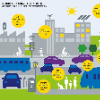The two fields of urban planning and artificial intelligence (AI) arose and developed separately. However, there is now cross-pollination and increasing interest in both fields to benefit from the advances of the other. In the present paper, we introduce the importance of urban planning from the sustainability, living, economic, disaster, and environmental perspectives. We review the fundamental concepts of urban planning and relate these concepts to crucial open problems of machine learning, including adversarial learning, generative neural networks, deep encoder-decoder networks, conversational AI, and geospatial and temporal machine learning, thereby assaying how AI can contribute to modern urban planning. Thus, a central problem is automated land-use configuration, which is formulated as the generation of land uses and building configuration for a target area from surrounding geospatial, human mobility, social media, environment, and economic activities. Finally, we delineate some implications of AI for urban planning and propose key research areas at the intersection of both topics.
翻译:---
摘要:
城市规划和人工智能发展多年来一直是相互分离的两个领域,但现在两个领域都对对方的进展越来越感兴趣,并开始交叉汇聚。本文介绍了城市规划从可持续性、生活、经济、灾难和环境等多个方面的重要性。我们回顾了城市规划的基本概念,并将这些概念与机器学习的重要问题联系起来,包括对抗学习、生成神经网络、深度编码器-解码器网络、对话式人工智能、地理和时间机器学习等,以评估人工智能对现代城市规划的贡献。因此,一个中心问题是自动生成土地用途配置,即从周围的地理空间、人类流动、社交媒体、环境和经济活动中为目标区域生成土地用途和建筑配置。最后,我们勾画了人工智能对城市规划的一些影响,并提出了两个领域交叉研究的关键问题。




